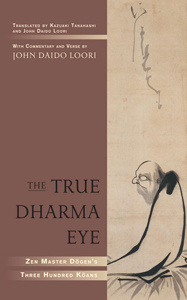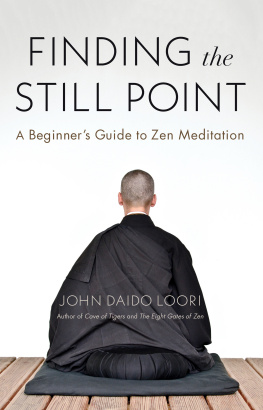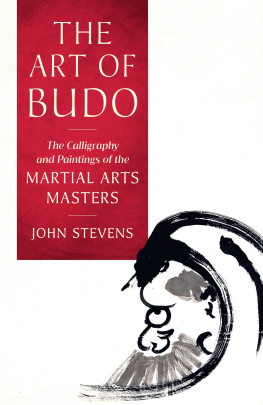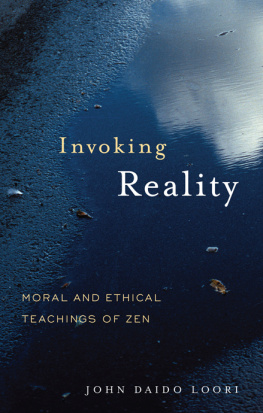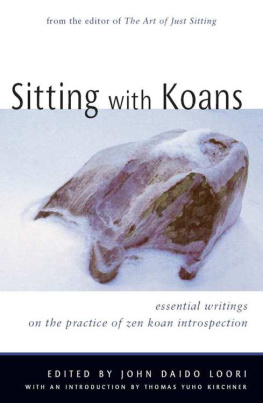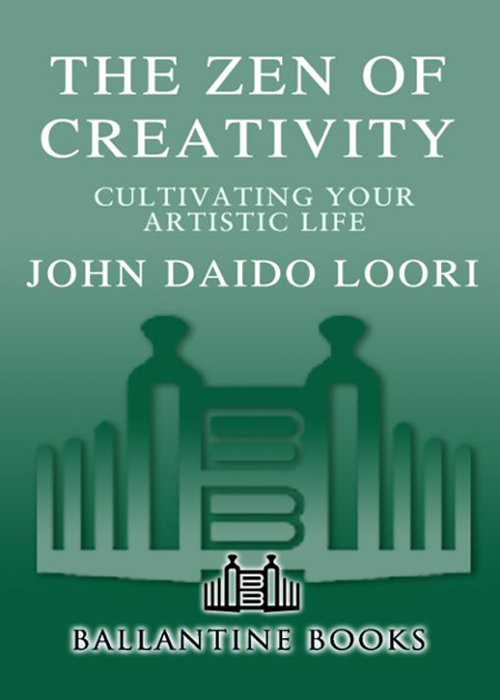
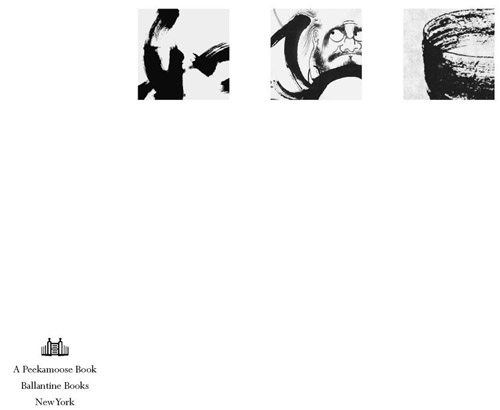
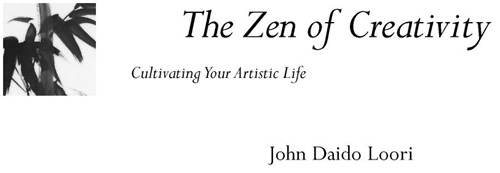
Table of Contents
Come said the muse,
Sing me a song no poet yet has chanted,
Sing me the universal.
In this broad earth of ours,
Amid the measureless grossness and the slag,
Enclosed and safe within its central heart,
Nestles the seed perfection.
WALT WHITMAN
PRAISE FOR The Zen of Creativity
Looris handsome and practical book will find crossover audiences from self-helpers and artists of all stripes.
Booklist
We dont know that we are already what we are trying to be. This sentence, from Loori-roshis new book can stop time. Ponder the we, the know, and the be deeply enough and life will begin to reflect the freedom, spontaneity, and simplicity which Loori identifies as the hallmark of Zen art. He has managed somehow, to fuse the best of art and the deepest realms of ordinary existence in a way that makes illuminated sense of both. As a practicing artist and Zen student, I loved this book. Its achievement is that a mechanic could too.
Peter Coyote, actor/writer
With consummate honesty, grace, and humor, John Daido Loori shows us how art making and spiritual practice are inseparable; each informs the other, ripening the precious moments of our lives. Embedded in his eloquent writing are delicious and inspiring photos, drawings and quotations by a wide range of creators, from Zen Master Dogen to Leonardo Da Vinci, Carl Sagan, and Walt Whitman. The Zen of Creativity is a vibrant and essential book.
Meredith Monk, composer/director/performer
This is a powerful book. Daido Loori has given himself over to it and thus to us completely. Giving yourself over to it, you may lose yourself, to great benefit and illumination. Giving yourself over to it, you may find yourself, to great benefit and illumination. These are not necessarily different. It is worth giving yourself completely. Why hold anything back? The author hasnt, and as a consequence, there is no end to this books riches, reflecting your beauty and creativity. That is some artistry! And also, as you will see, no big deal. Merely everything.
Jon Kabat-Zinn, author of Coming to Our Senses,Full Catastrophe Living, and Wherever You Go,There You Are
Artists and soul-searchers will find this book satisfying.
Library Journal
Acknowledgments
Its difficult for me to imagine creating a book without a cadre of bright, enthusiastic people for support. I have been blessed with a very special team that enabled the shaping of a manuscript out of my many years of teaching Zen and Creativity.
Principal among them has been Bonnie Myotai Treace, who provided me with a magic mirror that helped me better see and feel the reader.
My gratitude also to my day-to-day team of editors, Konrad Ryushin Marchaj and Vanessa Zuisei Goddard and Kenny Wapner, whose language skills and commitment to this project helped bring my words to the page without ever losing track of my voice. And to Chris Trevelyan, for his invaluable graphic assistance in preparing the images for publication.
Finally, I extend my thanks to all the students and friends who provided proofreading and important feedback during the long journey from conception to completion.
Introduction
The arts of Zen are not intended for utilitarianpurposes, or for purely aesthetic enjoyment,but are meant to train the mind, indeed,to bring it into contact with ultimate reality.
D. T. SUZUKI
Creativity is our birthright. It is an integral part of being human, as basic as walking, talking, and thinking. Throughout our evolution as a species, it has sparked innovations in science, beauty in the arts, and revelation in religion. Every human life contains its seeds and is constantly manifesting it, whether were building a sand castle, preparing Sunday dinner, painting a canvas, walking through the woods, or programming a computer.
The creative process, like a spiritual journey, is intuitive, nonlinear, and experiential. It points us toward our essential nature, which is a reflection of the boundless creativity of the universe.
Zen Buddhism and, particularly, the Zen arts are a rich source of teachings to help us understand and cultivate our creativity. Zen has become part of our popular culture, but the arts of Zen have yet to make a significant impact on the West. There are only a handful of books in English that deal with the Zen arts and most are no longer in print. The Zen arts contain a treasure house of techniques and insight into the creative process. And they point to a way of living that is simple, spontaneous, and vital. They profoundly impacted an entire culture in Asia but remain essentially untapped in the West.
This book is an introduction to the Zen arts, and an invitation to explore them as a way to help you live a more creative life. It is not a book about art history, art appreciation, or art theory. It will not teach you how to become a better artist, or how to sell your art. Hopefully, it will give you an appreciation of the Zen aesthetic and the power of creativity to affect both your art and the day-to-day encounters of your life.
Buddhism traces its history to its original teacher, Shakyamuni Buddha, who lived 2,500 years ago in India. The Buddha, upon his own enlightenment, saw that each and every being, as well as the great earth itself, is perfect and complete, lacking nothing. He pointed out that our idea of a separate, limited self is a painful delusion. The self is empty of any intrinsic characteristics. All the Buddhist teachings are skillful means to help people discover these truths for themselves.
When Buddhism first arrived in China from India during the first century, C.E., it encountered Confucianism and Taoism, Chinas indigenous religions. From the second to sixth centuries, the elaborate, richly textured metaphysics of Indian Buddhist thought came face-to-face with the earthy pragmatism of Chinese culture. Indian Buddhismreplete with long lists of meditative states, elaborate practices, and a whole host of deities, demons, and other celestial creatureswas imbued with Taoisms accent on simplicity and its deep appreciation of nature and the arts. These traits tempered Indian Buddhisms philosophical tendencies. The result was the very direct and practical kind of BuddhismZen.
In the sixth century C.E., Bodhidharma, considered to be the first ancestor of the Zen lineage, put forth the four points that define Zen:
Zen is a special transmission outside the scriptures,
With no reliance on words and letters.
A direct pointing to the human mind,
And the realization of enlightenment.
Zen is about the experience of Buddhas enlightenment, not the words and ideas that describe it. To understand or believe in enlightenment doesnt impart any lasting strength. But to realize it to make it real for yourselfcan transform your life. The teachings of Zen always point directly to the inherent perfection of each one of us. The Zen arts are a form of that direct pointing.
During its early history, Zen was influenced by the refined practices of Chinese poetry, painting, and calligraphy. The Tao of Painting, a book written around 500 C.E., is a classic canon on the art of painting as a spiritual path. In the action of no-action (
Next page


